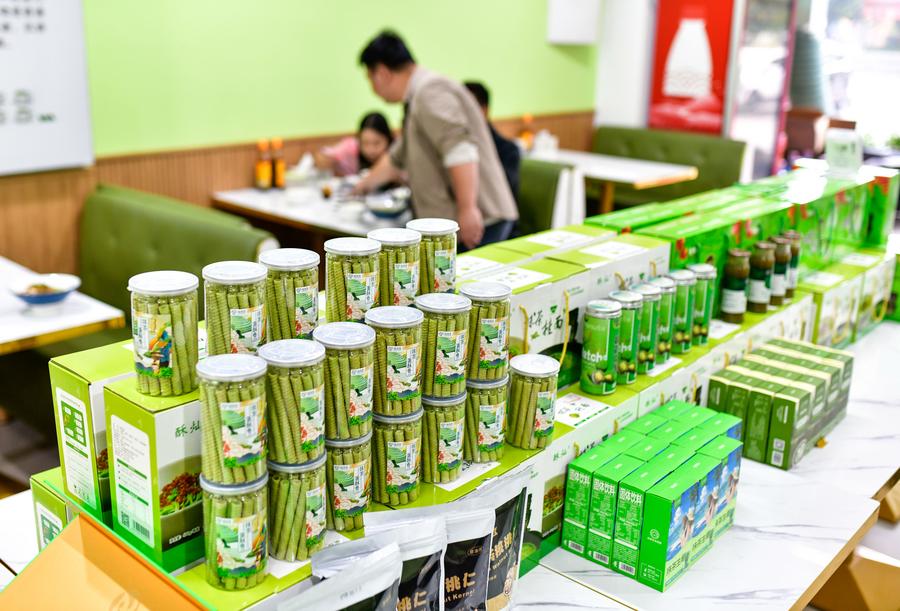




- BRNN
- BRI News
- BRNN News
- Database
Official Documents Polices and Regulations
Inter-government Documents International Cooperation BRI Countries
Business Guide Economic Data BRI Data
Trade
Investment Projects Latest projects
Cases - Content Pool

Matcha products are pictured at a store in Jiangkou county, southwest China's Guizhou Province, May 14, 2025. (Xinhua/Yang Wenbin)
Matcha, a finely ground powder of specially grown and processed green tea leaves, has been brewed into a thriving industry boosting the incomes of more than 110,000 farmers in Tongren city, southwest China's Guizhou Province.
China is the world's largest matcha producing country, and one-fourth of the country's matcha output comes from Tongren.
In 2024, Tongren's matcha production exceeded 1,200 tonnes, generating over 300 million yuan ($42.13 million) in output value, ranking first in China in both production and sales, and second globally in export volume.
Matcha products from the city are increasingly popular both domestically and overseas, exported to 52 countries and regions worldwide.
Last year, the city's matcha exports reached 180 tonnes. In the first half of this year alone, exports already totaled 230 tonnes—exceeding the previous year's total.
According to an executive in charge of foreign trade at a local company, the full implementation of the Regional Comprehensive Economic Partnership (RCEP) agreement has significantly boosted exports to ASEAN countries and Belt and Road countries.
Currently, Tongren matcha is widely used in beverages, baked goods, health products, cosmetics, and daily necessities.
The local applications of matcha have grown increasingly diverse, with local entrepreneurs developing innovative matcha-based products to meet rising consumer demand.
One example is "matcha fish," a new dish created by Yao Yan, a woman of the Tujia ethnic group who runs a restaurant in Tongren.
During peak periods, the dish sells over 50 servings daily, surpassing the city's traditional sour soup fish, according to Yao, who has also integrated matcha into the Tujia ethnic group's signature banquet dishes, creating a unique "matcha feast."
Bakers have also joined the trend, experimenting with local specialties to create matcha-infused products.
Tongren's booming matcha industry, coupled with rising consumer demand for matcha-related products, even attracted a considerable number of bakers from other cities, who have come to the city with an ambition to achieve entrepreneurial success.
For instance, Tang Yunpeng, a baker from northeast China's Jilin Province, has successfully developed more than 60 matcha-based products, including mooncakes incorporating the local specialty Cili (Rosa roxburghii), meaning "thorn pear" in Chinese.
His team has also been launching limited-time offerings aligned with China's 24 solar terms.
Matcha, also known as "Mo Cha," has a history dating back to the country's Wei and Jin dynasties (220-420) and flourished during the Song Dynasty (960-1279), when it enjoyed great popularity among scholars and literati.
By virtue of its huge output and diverse product types, Tongren has acquired a reputation as the "matcha capital of China" and "China's base of high-quality matcha."
Located at 27 degrees north latitude, Tongren enjoys a natural environment of high altitude, low latitude, and frequent mist and cloud cover, making it ideal for tea cultivation.
The matcha industry of Tongren covers seven key tea producing counties and 34 tea producing townships, sustaining the growth of more than 40 tea-grinding enterprises and providing employment for over 110,000 tea farmers.
Today, visitors strolling through the well-preserved historical and cultural block in Tongren can find matcha-themed shops scattered throughout the area, blending harmoniously with the quaint mountain streets and ancient alleys.
Jiangkou county, the core matcha producing area in Tongren, sees a tourism boom every holiday because of its high-quality matcha.
Nestled at the foot of Mount Fanjing, a natural site on UNESCO's World Heritage List, the county is crowded with visitors during holidays, with many coming specially for matcha.
Tongren is home to matcha plantations covering an area of 85,000 mu (about 5,667 hectares). In an effort to ensure more local farmers benefit from the growing matcha industry, the city has continuously expanded its matcha plantation areas and upgraded processing facilities, making production more efficient and convenient.
Within a 10-minute drive from veteran tea farmer Wang Junde's home, for example, there is a modern tea-processing workshop handling the rough grinding stage, a crucial step before producing fine matcha powder.

Tel:86-10-65363107, 86-10-65368220, 86-10-65363106